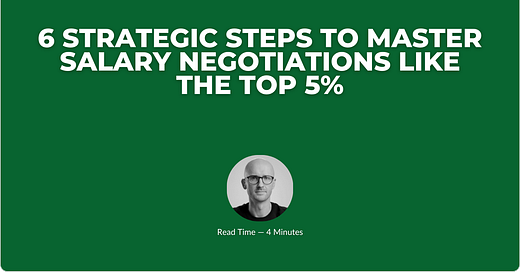6 Strategic Steps to Master Salary Negotiations Like the Top 5%
A proven framework for turning uncomfortable conversations into undeniable value.
Want to know the most expensive mistake professionals make in their careers?
Waiting for someone else to recognize their value.
They work harder, take on more responsibility, and hope their boss notices. Meanwhile, they're losing thousands in potential income every month.
Here's what most people don't realize: By the time you're asking for a raise, you've already missed the most crucial steps.
The real negotiation starts months earlier.
Here’s a proven system that I’m using to help my clients secure significant raises in 2025—especially those who hate confrontation.
I call it the +PARIS method:
(+) Plus: Set expectations early with clear roadmaps
(P) Prepare: Build your success portfolio
(A) Ask: Frame your request as an investment
(R) Reinforce: Stack undeniable achievements
(I) Inquire: Create multiple paths to yes
(S) Seal: Close with clear next steps
As Alex Hormozi says,
"The battle is won before it's fought."
Let me show you exactly how to stack the deck in your favor.
↓
(+) Plus: Set Clear Victory Conditions
Here's the move that separates top performers from everyone else: Start your negotiation 6-12 months before you ever ask for the raise.
Schedule a meeting with your manager and be direct:
"I want to create a roadmap of the value I can deliver over the next year to earn a compensation increase. Can we work together to define what that looks like?"
Map out 3-4 key milestones that would justify your target number.
Make them specific and measurable—think revenue targets, project deliverables, and team improvements. Then track progress quarterly.
This isn't just goal-setting—it's strategic positioning. When you return to discuss compensation, you're not making a request.
You're collecting on a promise you've already delivered.
(P) Prepare: Build Your Success Portfolio
The key to commanding top dollar isn't just doing great work—it's documenting it systematically. Create a living document that tracks:
Projects completed ahead of schedule
Client testimonials or peer feedback
Team improvements you've driven
Revenue generated or costs saved
Market salary data for your role
Turn every win into a metric. Don't just "improve team productivity"—show how you "increased team output by 47% while reducing overtime by 15%."
Numbers make your value undeniable.
(A) Ask: Frame It Like an Investment
Forget about tenure or personal needs. Position your raise as a business investment with clear ROI.
Start with: "I'd like to discuss how we can align my compensation with the additional value I'm creating for the company."
Then lay out your case with metrics that prove you're not an expense—you're an investment that pays for itself.
(R) Reinforce: Stack Your Wins
Want to make your value impossible to ignore? Stack achievements across multiple impact areas:
Team development
Innovation projects
Client relationships
Leadership initiatives
Process improvements
Each win reinforces the others, creating an undeniable pattern of excellence that justifies premium compensation.
(I) Inquire: Create Multiple Paths to Yes
Sometimes the timing isn't right for a straight salary increase. Be ready with alternative paths to increasing your compensation:
Professional development budgets
Flexible work arrangements
Performance bonuses
Equity compensation
Additional PTO
Remember: Every "no" is just an opportunity to find a creative path to "yes."
(S) Seal: Close With Clarity
A successful negotiation isn't over until you've locked down the details. End every compensation discussion with:
Clear next steps
Specific timelines
Written documentation
Expressed gratitude
Follow-up plan
Your professionalism here sets the stage for future negotiations.
That's it. Your Framework for Negotiation Success
Look, I get it. Negotiating can feel uncomfortable. But as Naval Ravikant says,
"You don't get what you deserve. You get what you negotiate."
The +PARIS method isn't just about getting a raise—it's about fundamentally changing how you position and prove your value in the workplace.
It's about making your worth so obvious that the negotiation becomes a formality.
You need to earn the right to win.
When you follow this framework for 6-12 months, you're not just asking for more money—you've earned the right to that higher compensation package.
Remember: Your future self is built on the courage of your present self to ask for what you're worth.
Now go get what you deserve.
Whenever you're ready, there are 2 other ways we can help you:
Opulus Method Digital Course: Join 350+ students inside the Opulus Method. In just 90 minutes, learn a proven system to secure your financial freedom without sacrificing your lifestyle.
Join Opulus as a Client: We'll build your personalized strategy to reduce taxes, boost your income, and grow your wealth. Live life on your terms—we'll execute the financial strategy to get you there.
Opulus, LLC (“Opulus”) is a registered investment advisor in Pennsylvania and other jurisdictions where exempted. Registration as an investment advisor does not imply any specific level of skill or training.
The content of this newsletter is for informational purposes only and does not constitute financial, tax, legal, or accounting advice. It is not an offer or solicitation to buy or sell any securities or investments, nor does it endorse any specific company, security, or investment strategy. Readers should not rely on this content as the sole basis for any investment or financial decisions.
Past performance is not indicative of future results. Investing involves risks, including the potential loss of principal. There is no guarantee that any investment strategies discussed will result in profits or avoid losses.
All information is provided "as-is" without any warranties, express or implied. Opulus does not warrant the accuracy, completeness, or reliability of the information presented. Opinions expressed are those of the authors, Ryan Greiser and Francis Walsh, and are subject to change without notice.
Opulus is not responsible for any errors or omissions, nor for any direct, indirect, or consequential damages resulting from the use or reliance on this information. Use of the content is at your own risk. This content is not intended as an offer or solicitation in any jurisdiction where such an offer or solicitation would be illegal.






